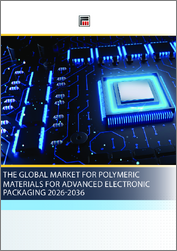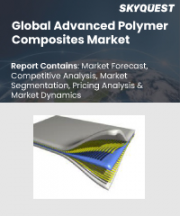
|
시장보고서
상품코드
1771350
폴리머 배트릭스 복합재(PMC) 시장 수요 및 예측 분석(2018-2034년)Global Polymer Matrix Composites Market Demand & Forecast Analysis, 2018-2034 |
||||||
폴리머 매트릭스 복합재(PMC)는 고분자를 유리, 탄소, 아라미드 등의 섬유로 강화하여 기계적, 열적 특성을 향상시킨 재료입니다. 이러한 복합재료는 폴리머의 경량성과 강화섬유의 강도와 내구성을 겸비하여 많은 산업 분야에서 유용하게 사용되고 있습니다. PMC는 우수한 강도 대 중량비, 내식성 및 설계 유연성으로 인해 금속이나 세라믹과 같은 기존 재료보다 점점 더 선호되고 있습니다.
지역 고찰
북미와 서유럽은 주요 항공우주, 자동차, 방위산업체의 존재, 강력한 R&D 인프라와 첨단 소재를 촉진하는 유리한 규제 환경으로 인해 PMC 시장을 주도하고 있습니다. 아시아태평양은 급속한 산업화, 자동차 및 항공우주 부문의 확대, 인프라 투자 증가로 인해 급격한 성장이 예상됩니다. 중국, 일본, 인도 등의 국가들은 폴리머 매트릭스 복합재(PMC)의 중요한 소비/생산 국가로 부상하고 있습니다.
라틴아메리카와 중동 및 아프리카의 신흥 경제 국가들은 성숙 지역에 비해 시장 침투가 아직 미진한 반면, 건설 및 제조 활동의 성장에 따라 PMC의 채택을 점차 늘리고 있습니다.
주요 기업
세계 PMC 시장의 주요 기업으로는 BASF, Henkel, Bostik, PPG Industries, DowDuPont, H.B. Fuller, Bondo Corp, General Latex & Chemical Corp, 3M, SIKA 등이 있습니다. 이들 기업들은 시장에서의 입지를 강화하기 위해 특성을 개선한 혁신적인 복합소재 개발, 생산능력 확대, 전략적 파트너십 형성에 주력하고 있습니다.
시장 성장 촉진요인 : 항공우주 및 자동차 산업 수요 증가
PMC 시장의 주요 촉진요인 중 하나는 항공우주 및 자동차 등 운송 부문의 경량 고강도 소재에 대한 수요 증가입니다. 세계 각국 정부가 연비 및 배기가스 규제를 강화하면서 제조업체들이 중금속을 PMC로 대체하도록 유도하고 있습니다. 또한, 건설 및 전자 분야에서 부식, 마모 및 환경적 악화에 대한 저항성을 갖춘 소재에 대한 요구가 증가하고 있는 것도 PMC의 다목적성과 내구성은 수명이 길고 유지보수가 적은 제품에 이상적이며, PMC의 채택을 더욱 촉진하고 있습니다.
전기자동차의 부상으로 열 관리 및 전기 절연 특성이 우수한 PMC에 대한 수요가 증가하고 있습니다. 재생 에너지 부문, 특히 풍력 및 태양광 발전은 내구성과 내후성이 뛰어난 복합재료를 필요로 하는 재생 에너지 부문도 성장을 가속하고 있습니다. 또한, 적층 가공 및 자동화와 같은 제조 기술의 발전으로 PMC의 생산 효율이 향상되고 비용이 절감됨에 따라 다양한 산업 분야에서 PMC를 쉽게 사용할 수 있게 되었습니다.
시장 성장 억제요인: 기술적 복잡성과 가공상의 어려움
폴리머 매트릭스 복합재(PMC)의 제조는 온도, 압력, 경화 시간을 정밀하게 제어해야 하는 복잡한 가공 기술을 필요로 합니다. 이러한 기술적 복잡성은 생산 주기가 길어지고 결함 발생 확률이 높아져 전체 수율과 신뢰성에 영향을 미칩니다. 또한 PMC는 가공 조건에 민감하기 때문에 확장성이 제한되고 숙련된 작업자와 고급 기계에 대한 의존도가 높습니다. 이러한 문제들은 중소 제조업체의 발목을 잡고, 빠르고 비용 효율적인 생산 방식을 우선시하는 산업에서 PMC의 채택을 제한할 수 있습니다.
세계의 폴리머 매트릭스 복합재(PMC) 시장에 대해 조사 분석했으며, 시장 역학 및 산업 동향, 각 부문별 수요, 제조업체 프로파일 등의 정보를 전해드립니다.
목차
제1장 서론
제2장 시장 요약
- 시장 발전
- 수요 개요
- 산업 구조
- 전략상 문제
- 최종 용도 동향
- 성장 예측
제3장 경제와 에너지 전망
- GDP와 인구통계
- 금융정책과 재정정책
- 원유 생산과 가격
- 천연가스
- 전기요금
제4장 최종 용도 부문 실적
- 항공우주 및 방위
- 자동차
- 건설
- 전기 및 전자
- 의료
- 기타
제5장 폴리머 배트릭스 복합재(PMC) 서론과 시장 개요
- 제품 설명
- 등급과 특성
- 원재료
- 제조 공정
- 환경 문제
- 밸류체인
- 용도
제6장 시장 역학과 산업 동향
- 시장 역학
- 성장 촉진요인
- 성장 억제요인
- 기회
- 과제
제7장 세계의 폴리머 배트릭스 복합재(PMC) 수요 분석 : 유형별, 용도별(수량과 금액)(2018년-2034년)
- 전략상 문제와 COVID-19의 영향
- 수요 분석과 예측(2018년-2034년)
- 수요
- 수요 성장률
- 성장 촉진요인 분석
- 세계의 폴리머 배트릭스 복합재(PMC) 시장 : 유형별
- 유리섬유 강화 폴리머(GFRP)
- 탄소섬유 강화 폴리머(CFRP)
- 아라미드 섬유
- 기타
- 세계의 폴리머 배트릭스 복합재(PMC) 시장 : 용도별
- 항공우주 및 방위
- 자동차
- 건설
- 전기 및 전자
- 의료
- 기타
제8장 수요 분석과 시장 리뷰 : 지역/국가별(수량과 금액)(2018년-2034년)
- 전략상 문제와 COVID-19의 영향
- 수요 분석과 예측(2018년-2034년)
- 수요
- 수요 성장률
- 폴리머 배트릭스 복합재(PMC) 시장 : 유형별
- 폴리머 배트릭스 복합재(PMC) 시장 : 용도별
- 북미
- 미국
- 캐나다
- 멕시코
- 서유럽
- 독일
- 프랑스
- 이탈리아
- 영국
- 스페인
- 기타 서유럽
- 중유럽 및 동유럽
- 러시아
- 폴란드
- 기타 중유럽 및 동유럽
- 아시아태평양
- 중국
- 일본
- 인도
- 한국
- 기타 아시아태평양
- 중남미
- 중동 및 아프리카
제9장 가격 분석
제10장 주요 전략상 문제와 사업 기회 평가
- 시장의 매력 평가
- 전망과 타겟 시장 조사
제11장 전략적 추천과 제안
제12장 기업 분석
- 폴리머 배트릭스 복합재(PMC) 제조업체 개요/기업 분석
- 기본 상세
- 본사 및 주요 시장
- 소유
- 기업 재무
- 제조거점
- 세계의 판매
- 총 직원수
- 제품 포트폴리오/서비스/솔루션
- 채택된 주요 사업 전략과 Prismane Consulting 개요
- 최근 발전
- 대상 기업
- BASF
- Henkel
- Bostik
- PPG Industries
- H.B. Fuller
- Bondo Corp.
- General latex & Chemical Corp.
- 3M
- SIKA
- 기타 제조업체
제13장 부록
LSH 25.07.22Polymer Matrix Composites (PMCs) are materials made by reinforcing polymers with fibers such as glass, carbon, or aramid to improve their mechanical and thermal properties. These composites combine the lightweight nature of polymers with the strength and durability of reinforcing fibers, making them valuable in many industries. Due to their superior strength-to-weight ratio, corrosion resistance, and design flexibility, PMCs are increasingly preferred over traditional materials like metals and ceramics.
Polymer Matrix Composites Demand, by Type
The market is primarily segmented based on the type of reinforcing fiber used. Glass Fiber Reinforced Polymers (GFRP) hold a significant share due to their cost-effectiveness and good mechanical properties, making them suitable for a wide range of applications from construction to automotive parts. Carbon Fiber Reinforced Polymers (CFRP) are known for their exceptional strength and lightweight characteristics, which are crucial for high-performance applications such as aerospace and defense, where weight reduction is critical without compromising strength. Aramid fibers, including well-known brands like Kevlar, offer high impact resistance and are commonly used in protective gear and aerospace components. Other fiber types include natural fibers and specialty synthetic fibers, which find niche applications in certain industries.
Polymer Matrix Composites Demand, by Application
PMCs are widely used across various sectors. Aerospace and defense industries utilize PMCs extensively for aircraft components, drones, and military vehicles due to their strength, light weight, and resistance to corrosion and fatigue. The automotive sector is adopting PMCs to manufacture lighter parts such as body panels, frames, and interior components, which help improve fuel efficiency and reduce emissions in compliance with stringent environmental regulations.
Construction benefits from PMCs in building reinforcements, roofing, and structural components because of their durability, resistance to moisture, and ease of installation. In electrical and electronics, PMCs are used for insulators, circuit boards, and enclosures due to their electrical resistance and thermal stability. The medical field leverages PMCs for prosthetics, implants, and medical devices that require biocompatibility and strength.
Regional Insights
North America and Western Europe lead the PMC market due to the presence of major aerospace, automotive, and defense manufacturers, along with strong R&D infrastructure and favorable regulatory environments promoting advanced materials. The Asia Pacific region is expected to experience the fastest growth, driven by rapid industrialization, expanding automotive and aerospace sectors, and increasing investments in infrastructure. Countries like China, Japan, and India are becoming significant consumers and producers of polymer matrix composites.
Emerging economies in Latin America, the Middle East, and Africa are gradually increasing PMC adoption as construction and manufacturing activities grow, although market penetration is still developing compared to more mature regions.
Leading Companies
Key players in the global PMC market include BASF, Henkel, Bostik, PPG Industries, DowDuPont, H.B. Fuller, Bondo Corp., General Latex & Chemical Corp., 3M, and SIKA. These companies focus on developing innovative composite materials with improved properties, expanding production capabilities, and forming strategic partnerships to strengthen their market positions.
Market Drivers: Rising demand from the Aerospace and Automotive industries
One of the main drivers of the PMC market is the increasing demand for lightweight, high-strength materials in transportation sectors like aerospace and automotive. Governments worldwide are enforcing stricter fuel economy and emission standards, pushing manufacturers to replace heavier metals with PMCs. Another key driver is the growing need for materials that offer resistance to corrosion, wear, and environmental degradation in construction and electronics. The versatility and durability of PMCs make them ideal for long-lasting, low-maintenance products, further boosting their adoption.
The rise of electric vehicles is creating demand for PMCs with excellent thermal management and electrical insulation properties. The renewable energy sector, particularly wind and solar power, also drives growth by requiring durable, weather-resistant composite materials. Moreover, ongoing advancements in manufacturing techniques, such as additive manufacturing and automation, are enhancing PMC production efficiency and reducing costs, making these materials more accessible across various industries.
Market Restraints: Technical Complexity and Processing Challenges
The manufacturing of polymer matrix composites (PMCs) involves intricate processing techniques that require precise control over temperature, pressure, and curing times. This technical complexity can lead to longer production cycles and higher chances of defects, impacting overall yield and reliability. Additionally, the sensitivity of PMCs to processing conditions limits scalability and increases dependency on highly skilled operators and advanced machinery. These challenges can deter smaller manufacturers and restrict PMC adoption in industries that prioritize fast, cost-effective production methods.
Table of Contents
1. Introduction
- Scope
- Market Coverage
- Types
- Applications
- Regions
- Countries
- Years Considered
- Historical - 2018 - 2023
- Base - 2024
- Forecast Period - 2025 - 2034
- Research Methodology
- Approach
- Research Methodology
- Prismane Consulting Market Models
- Assumptions & Limitations
- Abbreviations & Definitions
- Conversion Factors
- Data Sources
2. Market Synopsis
- Market Evolution
- Demand Overview
- Industry Structure
- Strategic Issues
- End-use Trends
- Growth Forecast
3. Economic & Energy Outlook
- GDP and Demographics
- Monetary & Fiscal Policies
- Crude Oil Production and prices
- Natural Gas
- Electricity Prices
4. End-use Sector Performance
- Aerospace & Defense
- Automotive
- Construction
- Electrical & Electronics
- Medical
- Others
5. Introduction to Polymer Matrix Composites and Market Overview
- Product Description
- Grades & Properties
- Raw Material
- Manufacturing Process
- Environmental Issues
- Value Chain
- Applications
6. Market Dynamics and Industry Trends
- Market Dynamics
- Drivers
- Restraints
- Opportunities
- Challenges
7. Global Polymer Matrix Composites Demand Analysis, By Types, By Applications (Volume, Value) (2018-2034)
- Strategic Issues and COVID-19 Impact
- Demand Analysis and Forecast (2018- 2034)
- Demand
- Demand Growth Rate (%)
- Driving Force Analysis
- Global Polymer Matrix Composites Market, By Types
- Glass Fiber Reinforced Polymers (GFRP)
- Carbon Fiber Reinforced Polymers (CFRP)
- Aramid Fibers
- Others
- Global Polymer Matrix Composites Market, By Applications
- Aerospace & Defense
- Automotive
- Construction
- Electrical & Electronics
- Medical
- Others
8. Demand Analysis and Market Review, By Region, By Country (Volume, Value), (2018- 2034)
- Strategic Issues and COVID-19 Impact
- Demand Analysis and Forecast (2018- 2034)
- Demand
- Demand Growth Rate (%)
- Polymer Matrix Composites Market, By Types
- Polymer Matrix Composites Market, By Applications
Note: Demand Analysis has been provided for all major Regions / Countries as mentioned below. The demand (consumption) split by types and applications have been provided for each of the countries / regions in Volume (Kilo tons) and Value (USD Million).
- North America
- USA
- Canada
- Mexico
- Western Europe
- Germany
- France
- Italy
- United Kingdom
- Spain
- Rest of Western Europe
- Central & Eastern Europe
- Russia
- Poland
- Rest of Central & Eastern Europe
- Asia-Pacific
- China
- Japan
- India
- South Korea
- Rest of Asia-Pacific
- Central & South America
- Middle East & Africa
Note: CAGR will be calculated for all types and applications to arrive at the regional / global demand growth for the forecast period (2025 - 2034)
9. Pricing Analysis
10. Key Strategic Issues and Business Opportunity Assessment
- Market Attractiveness Assessment
- Prospective & Target Market Study
11. Strategic Recommendation & Suggestions
12. Company Analysis
- Polymer Matrix Composites Manufacturers Profiles/ Company Analysis
- Basic Details
- Headquarter, Key Markets
- Ownership
- Company Financial
- Manufacturing Bases
- Global Turnover
- Total Employee
- Product Portfolio / Services / Solutions
- Key Business Strategies adopted and Prismane Consulting Overview
- Recent Developments
- Companies Covered -
- BASF
- Henkel
- Bostik
- PPG Industries
- H.B. Fuller
- Bondo Corp.
- General latex & Chemical Corp.
- 3M
- SIKA
- Other Manufacturers
Note: This section includes company information, company financials, manufacturing bases and operating regions. Company financials have been mentioned only for those companies where financials were available in SEC Filings, annual reports, or company websites. All the reported financials in this report are in U.S. Dollars. Financials reported in other currencies have been converted using average currency conversion rates. Company profiles may include manufacturers, suppliers, and distributors.
13. Appendices
- Demand - Regions
- Demand - Countries



















